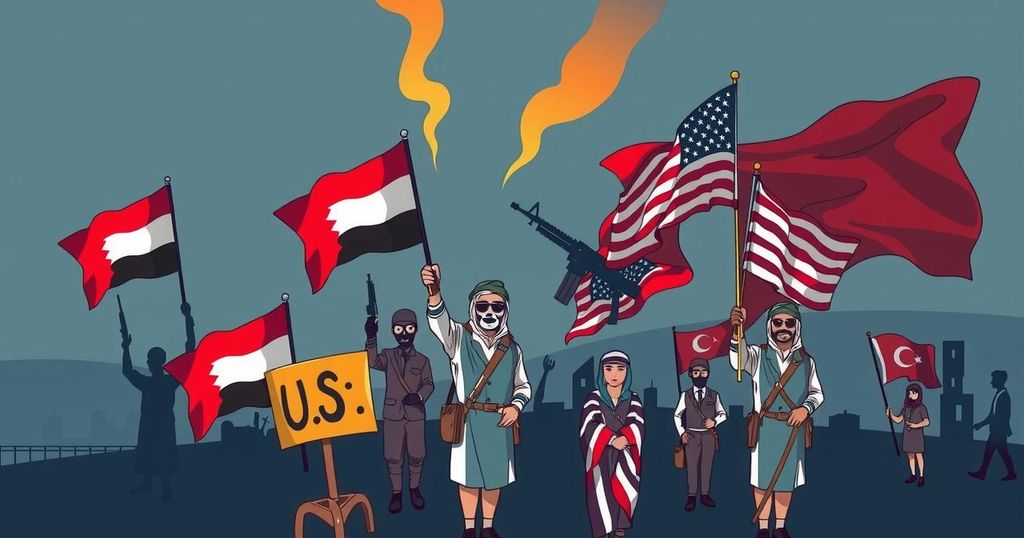The Qatari Media’s Anti-U.S. Campaign: A Study in Editorial Cartoons

Qatari media, through various cartoons, has launched an anti-U.S. campaign blaming America for supporting Israel’s military actions in Gaza. These publications depict the U.S. as a significant enabler of violence against Gazans, criticizing U.S. foreign policy and portraying Israel as controlling American political figures. This campaign aims to shift public perception and strengthen anti-U.S. sentiment amid ongoing conflicts.
In recent months, Qatari newspapers, both local and those published in London, have displayed overtly anti-American sentiments through the publication of several editorial cartoons. These illustrations depict the United States as mockingly complicit in Israel’s military actions in Gaza, portraying it as an accomplice supplying military, political, and legal aid to Israel. Some caricatures go so far as to suggest that Israel exercises control over the United States. In general, the Qatari media conveys a severe criticism of U.S. actions and policies, referring to America as “the cursed Uncle Sam” and blaming it for being a major instigator of terrorism globally, and for the ongoing turmoil in Gaza. Notably, certain pieces in the Qatari press have even expressed a desire for military confrontations with U.S. forces, with one op-ed in the Al-Watan daily suggesting that Iranian allies should attack U.S. troops, claiming that such actions would humiliate the U.S. Councils. Moreover, these cartoons characterize the United States as a nefarious entity dominating global affairs and facilitating Israel’s alleged crimes in Gaza. In depicting these sentiments, they often use metaphors of violence, with Uncle Sam depicted holding weapons that denote aggression against civilians in Gaza. Additionally, several illustrations reveal a constant theme of U.S. complicity, with imagery portraying U.S. President Biden coordinating with Israeli Prime Minister Netanyahu to target Gaza. Further depictions suggest that the U.S. provides ongoing military support, framing the U.S. as integral to the operations in Gaza, while political illustrations emphasize the U.S.’s defensive stance toward Israel despite international condemnation of its actions. Certain cartoons insinuate a lack of agency on the part of the U.S., illustrating that Israel holds significant influence over American political candidates and policies. This narrative shapes a broader Qatari media campaign which effectively places blame on the United States for the unfolding humanitarian crisis in Gaza and seeks to stir public sentiment against the U.S.’s foreign policy actions. This analysis encapsulates a thematic review of anti-American rhetoric emerging from Qatar through various caricatures published in its press over the last few months.
The media campaign in Qatar reflects a significant focus on anti-American sentiment connected to the ongoing conflict in Gaza. As the dynamics between Israel and Gaza continue to evolve, soft power forums such as newspapers play a pivotal role in shaping public opinion and highlighting perceived injustices. The use of editorial cartoons serves as an instrument for political expression, targeting the United States as a key player in facilitating Israel’s military actions, and highlighting the intertwining nature of global and regional politics in the Middle East. The ongoing tension and fallout from conflicts in Gaza amplify the criticisms directed toward U.S. foreign policy, fostering a climate where Qatari media seeks to convey an anti-U.S. narrative to audiences.
In summary, the Qatari press has cultivated a robust anti-American narrative through a series of editorial cartoons that portray the U.S. as an active supporter of Israeli aggression in Gaza. This narrative frames the U.S. as culpable in the humanitarian crisis and illustrates a broader critique of American foreign policy in the Middle East. By employing caricatures that depict the U.S. as both a puppet and a sponsor of violence, Qatar’s media strategy aims to influence public perception and galvanize regional sentiment against U.S. involvement in Middle Eastern conflicts.
Original Source: www.memri.org








